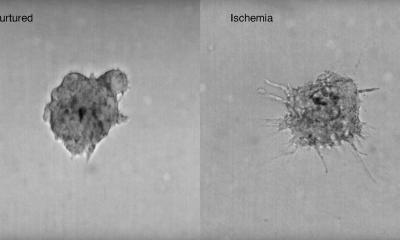News • New research
Circulating tumor cells to help stage metastatic breast cancer
Menarini Silicon Biosystems announced that a new study has found that using circulating tumor cells (CTCs), a form of liquid biopsy, holds promise as a key tool for developing a staging system that can have a significant impact in the treatment of metastatic breast cancer (MBC).
In this study, the largest CTCs pooled analysis study to date, researchers determined that the CTC count could be used to identify an indolent group of MBC patients who would benefit from more conservative instead of aggressive therapy, potentially reducing side effects for patients and costs for payers. CTC testing in the study was conducted using the US Food & Drug Administration (FDA) cleared Cellsearch System and will be reported and discussed at the 2018 annual meeting of the American Society of Clinical Oncology (ASCO), June 1-5 at McCormick Place in Chicago, Ill.
This analysis suggests that CTC testing can complement standard imaging studies and provide an even more accurate and sensitive method for staging patients with advanced breast cancer
Massimo Cristofanilli
"Our study found that there are 60 percent of MBC patients for which the disease may not be immediately aggressive," said study co-author Massimo Cristofanilli, M.D., F.A.C.P., Associate Director of Translational Research at Robert H. Lurie Cancer Center, Northwestern University. "This analysis suggests that CTC testing can complement standard imaging studies and provide an even more accurate and sensitive method for staging patients with advanced breast cancer." CTCs are cancer cells that are released and disseminated into the bloodstream and lymphatic system by advanced cancers. A liquid biopsy uses a sample of blood to detect circulating tumor markers (i.e. CTCs, ctDNA or exosomes) and provides a minimally invasive alternative to a solid tumor biopsy — especially when suspected cancer tissue is not accessible.
Cellsearch is the first and only clinically validated blood test cleared by the FDA for detecting and enumerating circulating tumor cells (CTCs) to help physicians manage patients with metastatic breast, prostate and colorectal cancers. The test is also approved by the China Food & Drug Administration for use in monitoring metastatic breast cancer patients. "There is already a substantial amount of data demonstrating that the Cellsearch CTC test provides clinically useful information," said Bob Roda, President and CEO of Menarini Silicon Biosystems Inc. "This latest study could have a profound clinical and economic impact on healthcare systems."
The Cellsearch System is the most extensively studied CTC technology, with research published in more than 450 peer-reviewed publications. To date, clinical data from 28 independent prospective studies involving more than 4,700 patients have validated the clinical value of Cellsearch CTC testing to predict progression-free survival and overall survival both before and after therapy initiation. Providing valuable information to help physicians make a patient management decision, the CELLSEARCH CTC test is performed at a reference laboratory using the CellsearchSystem. Cellsearch CTC testing can be used throughout a given therapy to monitor a patient's status by showing if their prognosis is favorable.
To learn more about the Cellsearch System, ASCO annual meeting attendees can visit Menarini Silicon Biosystems at Booth #3107.
Source: Menarini Silicon Biosystems
30.05.2018





